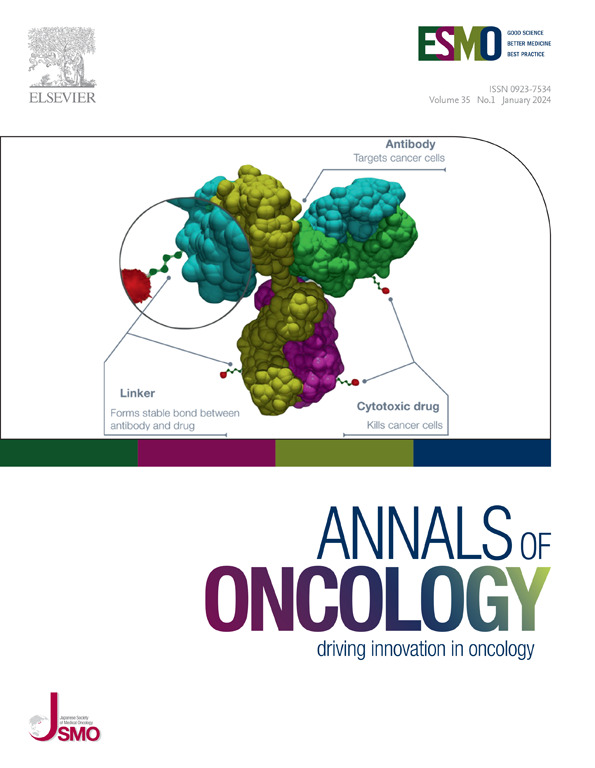Pembrolizumab 联合化疗治疗晚期和复发性宫颈癌:根据随机 KEYNOTE-826 研究中贝伐单抗使用情况的最终分析。
IF 56.7
1区 医学
Q1 ONCOLOGY
引用次数: 0
摘要
研究背景在KEYNOTE-826 (NCT03635567)中,pembrolizumab联合化疗(±贝伐单抗)显著改善了持续性、复发性或转移性宫颈癌患者的总生存期(OS)和无进展生存期(PFS)。这项探索性分析研究了根据贝伐珠单抗使用情况界定的患者亚组的结果:符合条件的成年患者既往未接受过化疗,也不适合接受根治性治疗;根据 RECIST v1.1 可测量疾病;东部合作肿瘤学组(Eastern Cooperative Oncology Group)表现状态≤1。患者按1:1比例随机接受每3周200毫克的pembrolizumab或安慰剂治疗,最多35个周期,外加化疗(±贝伐单抗15毫克/千克)。根据RECIST v1.1标准,双主要终点为OS和PFS,由研究者进行评估。根据贝伐单抗的使用情况对亚组的结果进行评估。危险比(HRs)和 95% CIs 基于分层 Cox 回归模型:617名患者接受了随机治疗(pembrolizumab治疗组,308人[63.6%使用贝伐珠单抗];安慰剂治疗组,309人[62.5%使用贝伐珠单抗])。排除贝伐珠单抗的最常见原因是医疗禁忌(75.9%)。在接受贝伐单抗治疗的患者中,PD-L1联合阳性评分(CPS)≥1(0.56 [0.43-0.73])和全基因组(0.57 [0.45-0.73])人群的PFS HRs(95% CIs)倾向于pembrolizumab治疗组;OS结果分别为0.60(0.45-0.79)和0.61(0.47-0.80)。在未接受贝伐单抗治疗的患者中,PD-L1 CPS≥1(0.61 [0.44-0.85])和全基因组(0.69 [0.50-0.94])人群的PFS HRs(95% CIs)也倾向于pembrolizumab治疗组;OS结果分别为0.61(0.44-0.85)和0.67(0.49-0.91)。在接受贝伐单抗治疗的患者中,pembrolizumab治疗组74.0%的患者和安慰剂治疗组66.8%的患者发生了≥3级的治疗相关不良事件:结论:在使用贝伐珠单抗的亚组患者中,与安慰剂加化疗相比,Pembrolizumab加化疗可延长PFS和OS,且安全性可控。本文章由计算机程序翻译,如有差异,请以英文原文为准。
Pembrolizumab plus chemotherapy for advanced and recurrent cervical cancer: final analysis according to bevacizumab use in the randomized KEYNOTE-826 study☆
Background
In KEYNOTE-826 (NCT03635567), pembrolizumab plus chemotherapy (±bevacizumab) significantly improved overall survival (OS) and progression-free survival (PFS) in patients with persistent, recurrent, or metastatic cervical cancer. This exploratory analysis examined outcomes in patient subgroups defined by bevacizumab use.
Patients and methods
Eligible adult patients had persistent, recurrent, or metastatic squamous cell carcinoma, adenosquamous carcinoma, or adenocarcinoma of the cervix not previously treated with chemotherapy and not amenable to curative treatment; measurable disease per RECIST v1.1; and an Eastern Cooperative Oncology Group performance status ≤1. Patients were randomly allocated 1 : 1 to pembrolizumab 200 mg every 3 weeks or placebo for up to 35 cycles plus chemotherapy (±bevacizumab 15 mg/kg). Dual primary endpoints were OS and PFS per RECIST v1.1 by investigator assessment. Outcomes were assessed in subgroups defined by bevacizumab use. Hazard ratios (HRs) and 95% confidence intervals (CIs) were based on a stratified Cox regression model.
Results
A total of 617 patients were randomly assigned [pembrolizumab arm, n = 308 (63.6% with bevacizumab); placebo arm, n = 309 (62.5% with bevacizumab)]. The most common reason for bevacizumab exclusion was medical contraindication (75.9%). Among patients who received bevacizumab, HRs (95% CIs) for PFS favored the pembrolizumab arm in the programmed cell death-ligand 1 combined positive score ≥1 [0.56 (0.43-0.73)] and all-comer [0.57 (0.45-0.73)] populations; OS results were 0.60 (0.45-0.79) and 0.61 (0.47-0.80), respectively. Among patients who did not receive bevacizumab, HRs (95% CIs) for PFS also favored the pembrolizumab arm in the programmed cell death-ligand 1 combined positive score ≥1 [0.61 (0.44-0.85)] and all-comer [0.69 (0.50-0.94)] populations; OS results were 0.61 (0.44-0.85) and 0.67 (0.49-0.91), respectively. Among patients who received bevacizumab, grade ≥3 treatment-related adverse events occurred in 74.0% of patients in the pembrolizumab arm and 66.8% in the placebo arm.
Conclusion
Pembrolizumab plus chemotherapy prolonged PFS and OS and had manageable safety compared with placebo plus chemotherapy in patient subgroups defined by bevacizumab use.
求助全文
通过发布文献求助,成功后即可免费获取论文全文。
去求助
来源期刊

Annals of Oncology
医学-肿瘤学
CiteScore
63.90
自引率
1.00%
发文量
3712
审稿时长
2-3 weeks
期刊介绍:
Annals of Oncology, the official journal of the European Society for Medical Oncology and the Japanese Society of Medical Oncology, offers rapid and efficient peer-reviewed publications on innovative cancer treatments and translational research in oncology and precision medicine.
The journal primarily focuses on areas such as systemic anticancer therapy, with a specific emphasis on molecular targeted agents and new immune therapies. We also welcome randomized trials, including negative results, as well as top-level guidelines. Additionally, we encourage submissions in emerging fields that are crucial to personalized medicine, such as molecular pathology, bioinformatics, modern statistics, and biotechnologies. Manuscripts related to radiotherapy, surgery, and pediatrics will be considered if they demonstrate a clear interaction with any of the aforementioned fields or if they present groundbreaking findings.
Our international editorial board comprises renowned experts who are leaders in their respective fields. Through Annals of Oncology, we strive to provide the most effective communication on the dynamic and ever-evolving global oncology landscape.
 求助内容:
求助内容: 应助结果提醒方式:
应助结果提醒方式:


